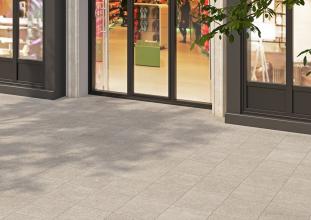Things that are reliable for a long time have a special value. Among the variety of finishing materials, only gres, due to its basic characteristics, is more resistant to aggressive environment, mechanical damage and pollution. Everyone is well aware that anything requires the regular care, gres tile is not an exception.
Proper and timely maintenance will extend the service life, as well as the corresponding appearance, so it should be started immediately after laying the tiles. First, residue of concrete, adhesive, epoxy grout must be carefully removed using a weak solution of hydrochloric acid or detergent based on the acid. Before this, it is recommended to moisten the surface with water, and only then start to remove construction waste. Pay special attention to the tile joints – the ingress of corrosive substances can lead to a disruption of the integrity of the grout layer and a change in its color. Begin with a thorough removal of dirt from the joints, as they accumulate dirt and harmful bacteria, and only then go to the tile.
In addition to regular cleaning, it is recommended that once a year gres surface should be treated with a special cleaning solution that prevents deep contamination, mold formation and deformation.
This product effectively protects the tile, helps as long as possible stay in its original form and extends the service life. Before applying the solution to the entire surface area, check it on the small invisible part of gres tile.
Taking care of the gres, try to avoid the constant use of abrasive products (paste and powders with abrasive particles, brushes with abrasive surface); despite the high hardness of the gres, over time micro damages will be visible.
Small stones, sand and dry dirt from the street are natural abrasives too, so they must be removed immediately.
Put special mats to prevent the spread of dirt at the entrance to the premises.
Depending on the type and nature of the contamination, one or other detergent or cleanser should be used:
· universal detergents recommended for the care of ceramic surfaces
· cleansers on an alkaline basis
· detergents on acid or alcohol basis (use only with strong impurities)
· solvents
Here are examples of some types of contamination and the means to clean them up:
|
Type of contamination |
Recommended detergents and cleansers |
|---|---|
| Dust and household rubbish | Universal detergents |
| Food dye Drinks (coffee, tea, juice, beer, wine) Blood stains |
If the stains are fresh, you can clean them up by dissolving in water a small amount of baking soda For old, dried stains use a detergent or cleanser for gres on an alkaline basis |
| Vegetable oil and animal fat | Cleansers on an alkaline basis |
| Felt-tip pen, marker | Detergents on acid or alcohol basis |
| Building materials, lime, plaster, cement, traces of rust | Household chemicals with acid or acid solutions |
| Building paints, silicone or super glue, gum, stamp-pad ink, ink | Use solvents – benzine, acetone |
| Varnishes, paints, candle wax | Use solvents – benzine, acetone |
| Rubber, resin, bitumen, mechanical oil, stains from tires | Use solvents – benzine, acetone |
Focus on!
· Despite the stability of epoxy materials to the chemical effects of substances, the frequent use of acid-based products is not recommended, they do not cause damage to the gres tile, but they can gradually destroy the tile joints or change the color of the grout. For washing, ordinary soft liquid household chemicals can be used.
· Avoid constant use of abrasive cleansers – brushes with abrasive bristles, pastes, powders.
· Although gres is a very durable material, protect the tile surface from point impacts and the fall of heavy objects.
Any contamination should be removed immediately, after the appearance; this will eliminate the additional difficulties in further use. It is necessary to follow the simple rules of systematic care in order to enjoy the beauty and practicality of the gres covering for a long time.



